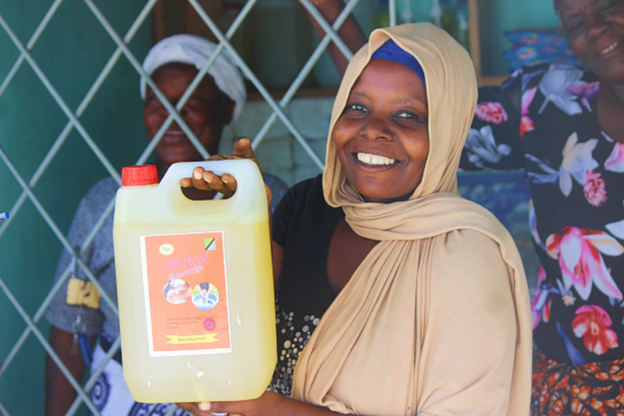Success Story
Stories from Tanzania COVID-19 Response: Lukundane group spreading positive impact to the community in Yombo Vituka
September 22, 2022
In response to the COVID-19 pandemic in Tanzania, NPI EXPAND implemented a grants program that supported three new and underutilized local partner NGOs for about 6-8 months from July 2020-April 2021. The three NGOs supported 25 WORTH Yetu community groups to add to their income generating activities by producing, promoting, and selling non-medical masks and sanitation products (liquid soap, hand sanitizer). The following story comes from one of these groups. You can read more about the COVID-19 program and lessons learned on our website here.
Members of the Lukundane group had not viewed their collective fund as potential capital for a group business. Mostly composed of elderly women each running her own small business, the group was primarily used as a saving scheme which also contributed to the welfare of orphaned and vulnerable children (OVC) in Yombo Vituka. “We worked together very well because we had committed members who loved and respected each other. But when it came to business, everyone had and only cared about their own. Despite having group savings, we did not know that a group business was a viable option,” says Helena Mweka, the group’s treasurer.
The group that gets its name from a Chaga word for “love” was established in February 2018 as an outcome of community mobilization efforts by a livelihood volunteer working with PASADA, a local NGO.
Luphina, the Secretary, is one of the younger members who actively supports the group’s operations. She attributes her hard work and commitment to her love for her community and says, “I am one of the group’s youngest members. This group means a lot to me since many of the ladies here are like my older sisters. They have known and supported me since I was a child, and it is a pleasure to utilize my strength now to serve them and my community as a way of repaying their kindness.”
As the group’s secretary, Luphina was instrumental in ensuring that the project was favorably received by other group members. Prior to the NPI EXPAND project, the group had never engaged in a collaborative commercial endeavor, let alone one that required physically demanding work from members. As a result, when the project was introduced, Luphina was quick to persuade her older colleagues that the younger members were eager to put in more work to enable the group to raise more money for each other’s benefit as well as for the OVC they were supporting.
The group began working after receiving training and business starter kits for production of masks and sanitation products. The group opted to reinvest the profit from the sale of the first batch of masks and soaps made from the starter kit to sustain this new business enterprise instead of keeping the earnings for distribution among members.
The group had a strategic advantage when it came to mask production, since its chairperson is a seasoned tailor who formerly owned a small tailoring establishment in Yombo Vituka. From the two machines that were already at the tailoring shop, the group now had four, which could enable them to expand into other product lines if they had trained tailors to fulfill the market’s quality and quantity demands.
The group has sustained its tailoring business, producing market-ready clothing that they sell during market days in the nearby region of Morogoro. By diversifying into tailoring and leveraging an existing business, they have raised their monthly group income by about TZS 200,000. In keeping with their goal to spread social impact, the company has hired three young women as trainees, who are earning small commissions on any products they create while learning on the job. The Lukundane group is also in the process of mentoring young women to form their own savings and loan group.
Safria Selemani, one of the trainees at the tailoring shop, is grateful for the opportunities brought by the project. She says:
“In a short period of time, I improved my tailoring abilities. I would have been subject to forced marriage if I had not had the opportunity to pursue my official education. I feel like I’m in charge of my own destiny now. The aim is that in two years, I will have graduated and will be able to open my own small tailoring shop using the commissions I earn here and the skills I am learning.”

PAMONA branded hand-washing soap made by Twaweza group based in Magu, Mwanza Region